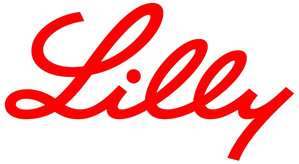INDIANAPOLIS, June 24, 2021 /PRNewswire/ -- The U.S. Food and Drug Administration (FDA) granted Breakthrough Therapy designation for donanemab, Eli Lilly and Company's (NYSE: LLY) investigational antibody therapy for Alzheimer's disease (AD). The Breakthrough Therapy designation aims to expedite the development and review of drugs that are intended to treat a serious condition when preliminary clinical evidence indicates that the drug may demonstrate substantial improvement on a clinically significant endpoint(s) over already available therapies that have received full FDA approval.
The FDA Breakthrough Therapy designation is based on clinical evidence for donanemab, an investigational antibody that targets a modified form of beta amyloid called N3pG. The company's Phase 2 trial, TRAILBLAZER-ALZ, studied the efficacy and safety of donanemab in patients with early, symptomatic AD. These data were presented at the 15th International Conference on Alzheimer's & Parkinson Diseases™ 2021 (AD/PD™ 2021) and published simultaneously in the New England Journal of Medicine.
Lilly intends to submit a biologics license application (BLA) for donanemab under the accelerated approval pathway later this year based on data from TRAILBLAZER-ALZ. The safety, tolerability and efficacy of donanemab are also being evaluated in the ongoing randomized, placebo-controlled, double-blind, multi-center Phase 3 study TRAILBLAZER-ALZ 2 (NCT04437511).
To learn more about the TRAILBLAZER-ALZ 2 study or to see if you prequalify, visit http://www.trailblazer2study.com.
About TRAILBLAZER-ALZ Study
TRAILBLAZER-ALZ (NCT03367403) is a randomized, placebo-controlled, double-blind, multi-center Phase 2 study to assess the safety, tolerability and efficacy of donanemab in patients with early symptomatic Alzheimer's disease. The trial enrolled 272 patients who were selected based on cognitive assessments in conjunction with amyloid plaque imaging and tau staging by PET imaging. The study's primary endpoint was change from baseline until 76 weeks in the Integrated Alzheimer's Disease Rating Scale (iADRS), a composite tool combining the Alzheimer's Disease Assessment Scale-Cognitive subscale (ADAS-Cog13) and the Alzheimer's Disease Cooperative Study - instrumental Activities of Daily Living (ADCS-iADL) for function. Key secondary endpoints included changes between baseline and 76 weeks in the Alzheimer's Disease Assessment Scale-Cognitive Subscale (ADAS-Cog13), ADCS-iADL, MMSE, and Clinical Dementia Rating Scale Sum of Boxes (CDR-SB) scores. Other secondary biomarker endpoints included changes from baseline to week 76 in brain amyloid deposition and brain tau deposition and volumetric MRI.
About Alzheimer's Disease
Alzheimer's disease is a fatal illness that causes progressive decline in memory and other aspects of cognition. Dementia due to Alzheimer's disease is the most common form of dementia, accounting for 60 to 80 percent of all cases1. There are currently over 50 million people living with dementia around the world, with numbers expected to increase to nearly 152 million by 20502. Almost 10 million new cases of dementia are diagnosed each year worldwide, implying one new case every 3 seconds, and a significant increase in the caregiving burden placed on society and families. In the US alone, there was an increase of 8 million new caregivers from 2015 to 20203. The current annual societal and economic cost of dementia is estimated at $1 trillion, an amount that is expected to double by 2030 unless we find a way to slow the disease2.
About Eli Lilly and Company
Lilly is a global health care leader that unites caring with discovery to create medicines that make life better for people around the world. We were founded more than a century ago by a man committed to creating high-quality medicines that meet real needs, and today we remain true to that mission in all our work. Across the globe, Lilly employees work to discover and bring life-changing medicines to those who need them, improve the understanding and management of disease, and give back to communities through philanthropy and volunteerism. To learn more about Lilly, please visit us at lilly.com and lilly.com/news. P-LLY
Lilly Cautionary Statement Regarding Forward-Looking Statements
This press release contains forward-looking statements (as that term is defined in the Private Securities Litigation Reform Act of 1995) about Lilly's Alzheimer's disease platform, including donanemab as a potential treatment for people with early symptomatic Alzheimer's disease, and reflects Lilly's current beliefs and expectations. However, as with any such undertaking, there are substantial risks and uncertainties in the process of drug research, development, and commercialization. Among other things, there is no guarantee that future study results will be consistent with study findings to date, that donanemab will prove to be a safe and effective treatment, or that donanemab will receive regulatory approval. For further discussion of these and other risks and uncertainties, see Lilly's Form 10-K and Form 10-Q filings with the United States Securities and Exchange Commission. Except as required by law, Lilly undertakes no duty to update forward-looking statements to reflect events after the date of this release.
______________________
1. Alzheimer's Association. Facts and Figures. https://www.alz.org/alzheimers-dementia/facts-figures. Accessed December 8, 2020.
2. Alzheimer's Disease International. World Alzheimer Report 2019. https://www.alz.co.uk/research/WorldAlzheimerReport2019.pdf. Accessed December 8, 2020.
3. AARP. 2020 Report: Caregiving in the U.S. https://www.aarp.org/content/dam/aarp/ppi/2020/05/full-report-caregiving-in-the-united-states.doi.10.26419-2Fppi.00103.001.pdf. Accessed December 8, 2020
Refer to: |
Dani Barnhizer; [email protected]; 317-607-6119 (Media) |
Kevin Hern; [email protected]; 317-277-1838 (Investors) |
SOURCE Eli Lilly and Company

Related Links
WANT YOUR COMPANY'S NEWS FEATURED ON PRNEWSWIRE.COM?
Newsrooms &
Influencers
Digital Media
Outlets
Journalists
Opted In




Share this article